How We Organize: Protecting Pennsylvanians From Fracking
Published Apr 5, 2024
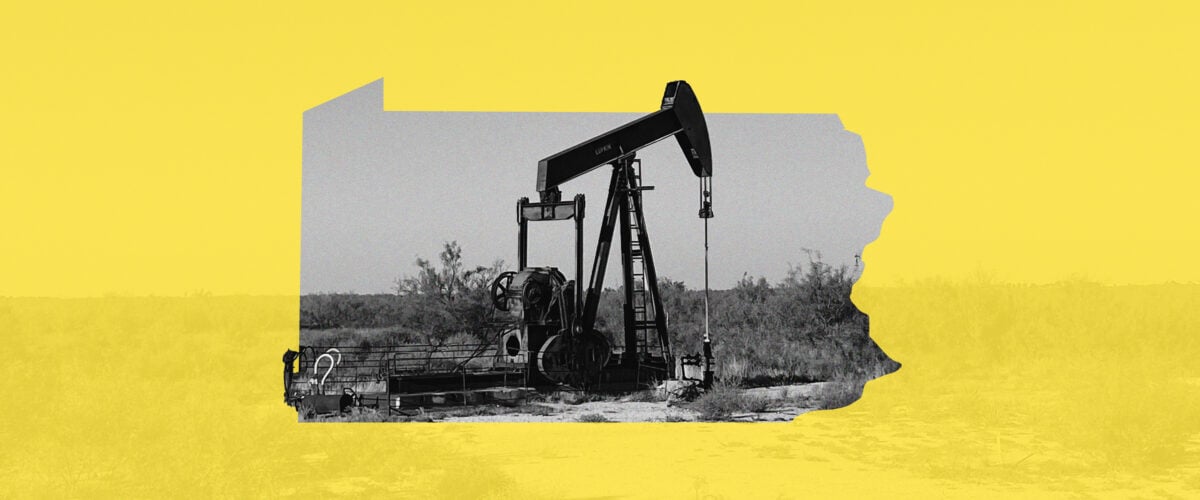
Food & Water Watch's Municipal Ordinance Project is one of the most successful campaigns to curb fracking in Western PA. Here's how we do it.
Before I came to Food & Water Watch, I didn’t know a lot about organizing. Like many folks, I supported and donated to organizations and celebrated their victories. But I always wondered, how did it happen? What were the “nuts and bolts” of building a win?
Since joining Food & Water Watch, I’ve learned a lot about exactly that. In this series, “How We Organize,” volunteers and organizers on the front lines of these issues peel back the curtain and talk shop. If you’ve ever wondered how we organize and win, you’re in the right place.
Previously, we covered our recent win stopping radioactive waste dumping in New York’s Hudson River, and another protecting communities from factory farms in Oregon. Today, we’re diving into our municipal ordinance project against fracking in Allegheny County, Pennsylvania.
How to Stop Fracking in the Heart of Fracking Country
Western Pennsylvania is one of the epicenters of the United States’ fracking boom. After the birth of “unconventional drilling,” frackers spawned well pads across the region, plaguing residents with pollution and the resulting health impacts.
A few years ago, there was a sense that Allegheny County — home to the City of Pittsburgh and more than a million Pennsylvanians — might be spared the fate of its heavily fracked neighbors. But Food & Water Watch wasn’t convinced. Oil and gas leases were increasing in the County, as were wells.
While Pennsylvania law bars municipalities from banning fracking outright, they can regulate it through ordinances. For example, they can keep it off certain lands and require frackers to institute safety measures.
To take advantage of this tool, Doug Shields, former Pittsburgh City Councilman and Outreach Liaison with Food & Water Watch, worked with us to build the Municipal Ordinance Project (“MOP”). With the MOP, our Pennsylvania team works with local organizations and residents to get strong and protective ordinances on the books.
Since it began in 2018, the MOP has become the most successful program in Western Pennsylvania to fight fracking. We’ve helped pass 25 ordinances in Allegheny County, protecting more than 530,000 residents from fracking. In 2022, we banned fracking altogether in County Parks.
Statewide, we’ve passed 35 fracking ordinances. Right now, we’re working in nearly a dozen municipalities and planning to reach out to dozens more in 2024.
The MOP’s success comes from building people power that pressures elected officials to do the right thing. And this grassroots organizing has not only won protective local ordinances; it has pushed a sea change against fracking throughout the region.
For years, the industry has had a chokehold on local politics and economies. Now, more and more residents are standing up for their health and communities, saying “Enough is enough.”
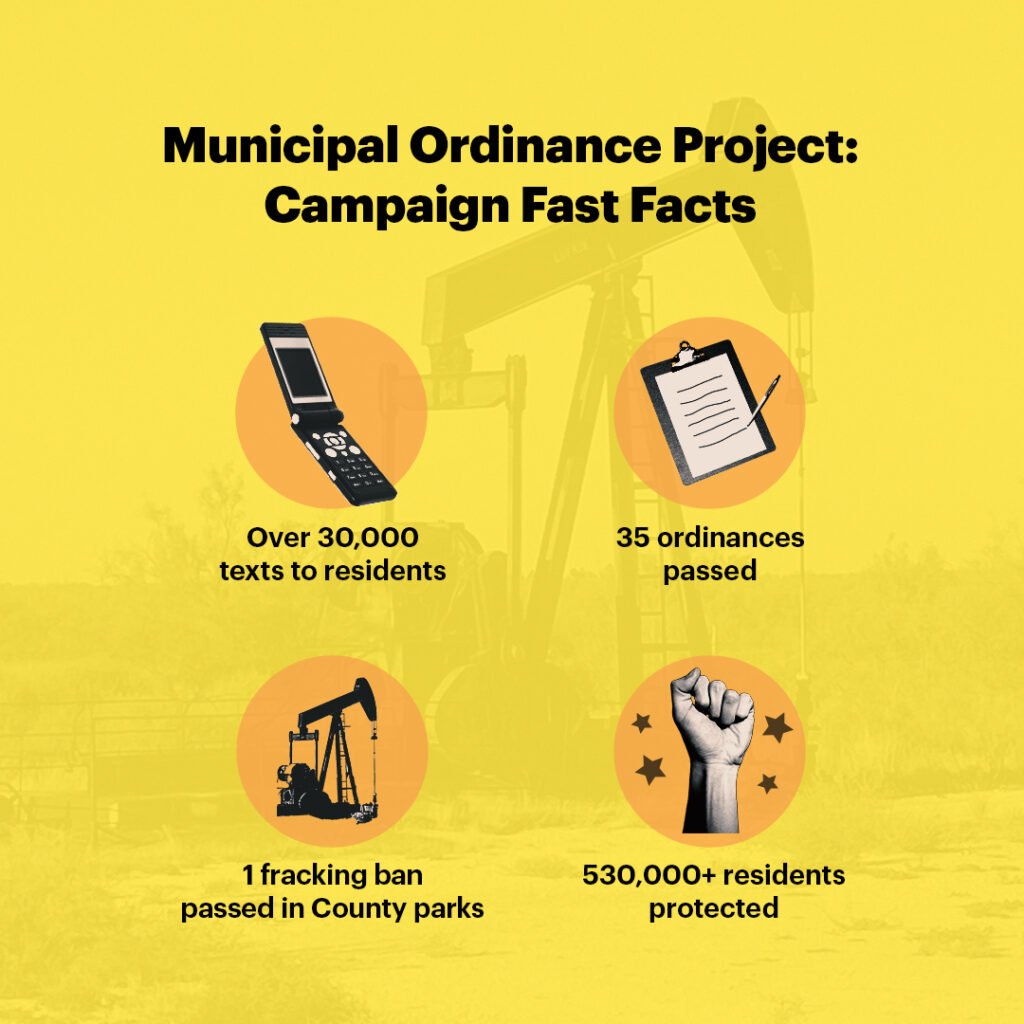
Getting Fracking Out of Franklin Park
In many cases, ordinance campaigns start with site fights — efforts to stop a certain project in a certain place. One of the first MOP campaigns took place in Franklin Park Borough, about a dozen miles outside of Pittsburgh.
In the spring of 2018, Thaddeus Popovich learned through a friend about a proposal to frack in Franklin Park. Thaddeus had settled in town after his cardiologist recommended he move away from the Shenango Coke Plant for his health. The plant was one of the biggest air polluters in Allegheny County.
Thaddeus had escaped Shenango, only to face the prospect of yet another public health scourge for a neighbor. So he went to the Borough Council office for more information.
There, he learned that the president of PennEnergy Resources had recently presented a fracking proposal at a Council pre-meeting, not open to the public. Thaddeus had to file a Right-to-Know request1In Pennsylvania, as in many states, a Right-to-Know law allows residents access to records from public agencies and governments to get the meeting notes.
“So I got all this information and said, ‘How do I get people riled up like I was riled up?’” Thaddeus remembered. PennEnergy’s proposal was especially worrisome because it included fracking in the beloved, 80-acre Linbrook Park.
Luckily, his friend Doug Shields reached out. Doug helped Thaddeus get set up with ThruText, a software that Food & Water Watch uses to more easily send text messages to community members. They notified neighbors that a fracking lease was on the table, and asked if they were concerned and wanted to learn more.
“We got a tremendous response from that,” Thaddeus said. “So we started meeting … and then we started showing up at Council meetings, and speaking, and making testimonies.”
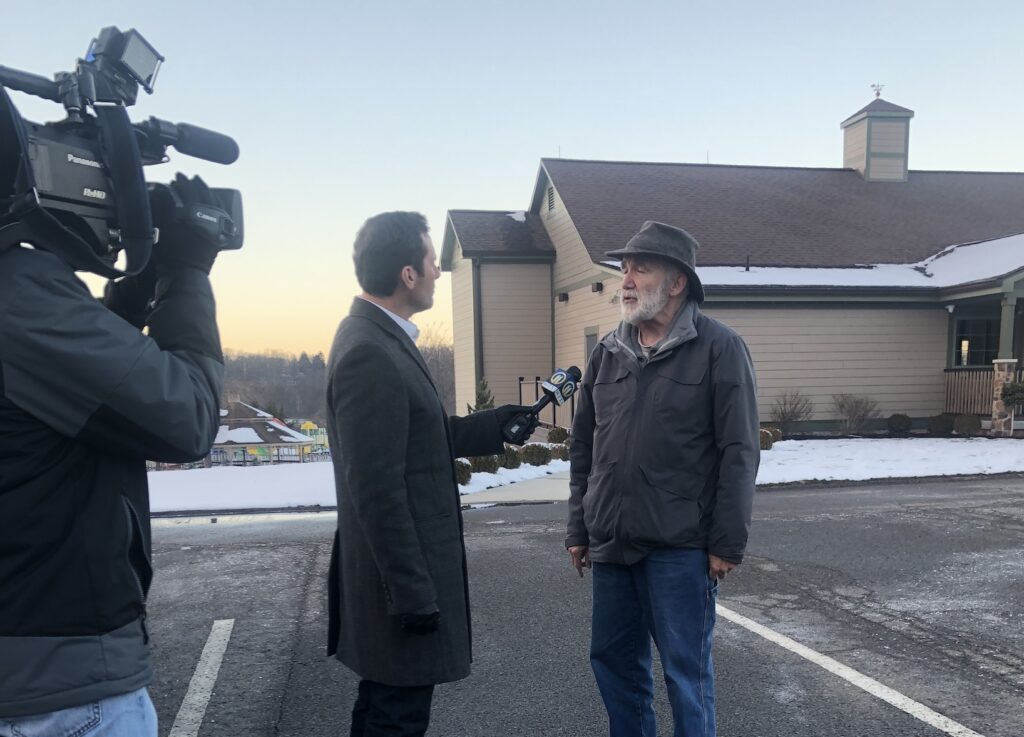
Thus, the group Protect Franklin Park was born. It began holding events and garnering media attention, and then in January 2019, PennEnergy’s lease was put to a vote at the Borough Council.
“The room was packed,” Thaddeus recalled. And the vote came down opposing the lease. “The whole room broke out into a straight chorus of applause, and everyone hugging,” he continued. “We were all giddy.”
That win laid the foundation for Protect Franklin Park to take it to the next level. In September 2019, the Borough passed a municipal ordinance to regulate fracking and keep it out of Linbrook Park for good.
In this interview, Thaddeus joined our PA Senior Organizer Robin Lesko to break down how they built this win — and how you can get involved in fights like these. This interview has been edited for clarity and length.
Neighbors Organizing With Neighbors to Protect Each Other
Mia: Can you talk about what it took to win the fight in Franklin Park, and how that turned into a municipal ordinance regulating fracking?
Robin: It was a really remarkable group. We split into so many different teams. Immediately, we had our canvassing team, we had our Council lobbying team, we had our ordinance-writing team, our mini legal team. We had our social media outreach team. It was — and is — incredibly remarkable. We were a well-oiled machine.
Thaddeus: And we were energized — it was too close to us. So we could talk about property values, we could talk about Linbrook Park — “Would you like your children playing on Linbrook Park when fracking is going on underneath?”
Robin: One of our volunteers, Dana, as soon as she found out and became part of the group, her kids play soccer, so she told every single sports association that used Linbrook Park about what was being planned for that. She helped drive a lot of petition signatures coming from that area, saying “This is a family issue. This is a safety issue.”
Then, right after they voted down the lease, you all [at Protect Franklin Park] got together and organized to make sure that we passed a really strong ordinance.
We were able to keep fracking completely out of the park. We were able to put really strong protective conditions in there. And you all worked nonstop to create these recommendations and lobbied Council and did so much outreach.
Everybody organized to show up for every public meeting, from December 2018 through September of 2019, to not only get the lease defeated, but also to keep the momentum going to get one of the strongest ordinances in Southwest Pennsylvania passed. It was an incredible show of people power!
Thaddeus: That’s what many people don’t know. We know that, so let’s spread the news! The way the media presents these things, we don’t have any wins. We do have wins.
Robin: Big ones!
Thaddeus: So we want the media and others to know about the wins, so they can feel more confident.
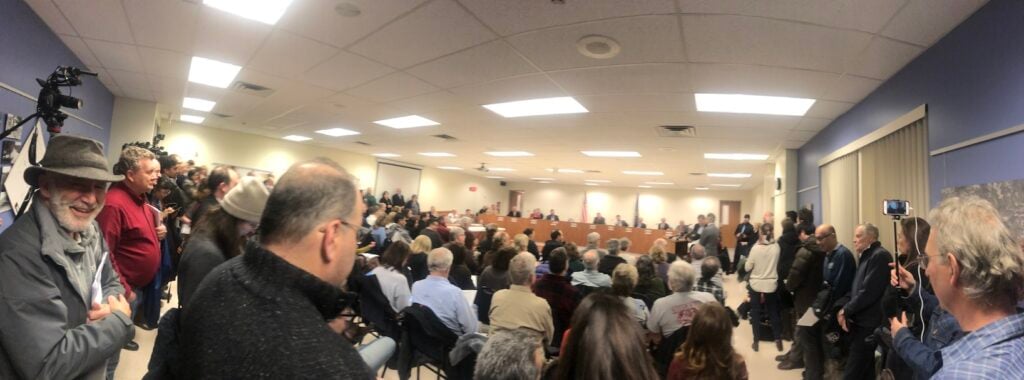
Using Legal Strategy and People Power to Fight Like We Live Here… and Win
Mia: The MOP has been very successful in curtailing fracking, but it’s a much different approach from the bans Food & Water Watch has fought for and won in other places. Why pursue the strategy of municipal ordinances to fight fracking?
Thaddeus: For me, it was personal. It’s where I lived. In general, I didn’t like fracking to begin with, because it’s fraught with a lot of dangerous things … For me to have it in my backyard where I live, that is unacceptable. So I took it very personally, and I was trying to get my friends who lived there to be personal with it as well.
Robin: You really embody “Fight like you live here,” which is our motto!
What really stuck with me while we’re talking right now is how you’ve said, “People don’t know what they don’t know.” And I’m thinking about that with ordinances, and how local government works.
So many people in municipalities think that we’re still governed by something called Act 13 of 2012, which basically gave the oil and gas industry eminent domain2Eminent domain is the power a government has to take private property for “public” use. everywhere in Pennsylvania. But it’s actually unconstitutional! That was overturned.
That’s how we can then say, through different examples of case law, that municipalities have the power to help people through their planning codes and their zoning.
Pennsylvania zoning, in particular, is governed by something called the Municipalities Planning Code. Though we’re bound by the PA Oil and Gas Act and we can’t ban fracking per se — yet! — we can write really powerful protective ordinances.
We can dictate in our municipality where certain uses3Zoning ordinances lay out where different land uses (e.g. industrial, residential, agricultural) are allowed in a municipality. can go, rather than a company or an industry coming in and dictating where they want it to be; dictating the character and content of our community.
It puts power back in the hands of the people, whether they’re an elected official, but most importantly the people who put elected officials into place, which are their constituents.
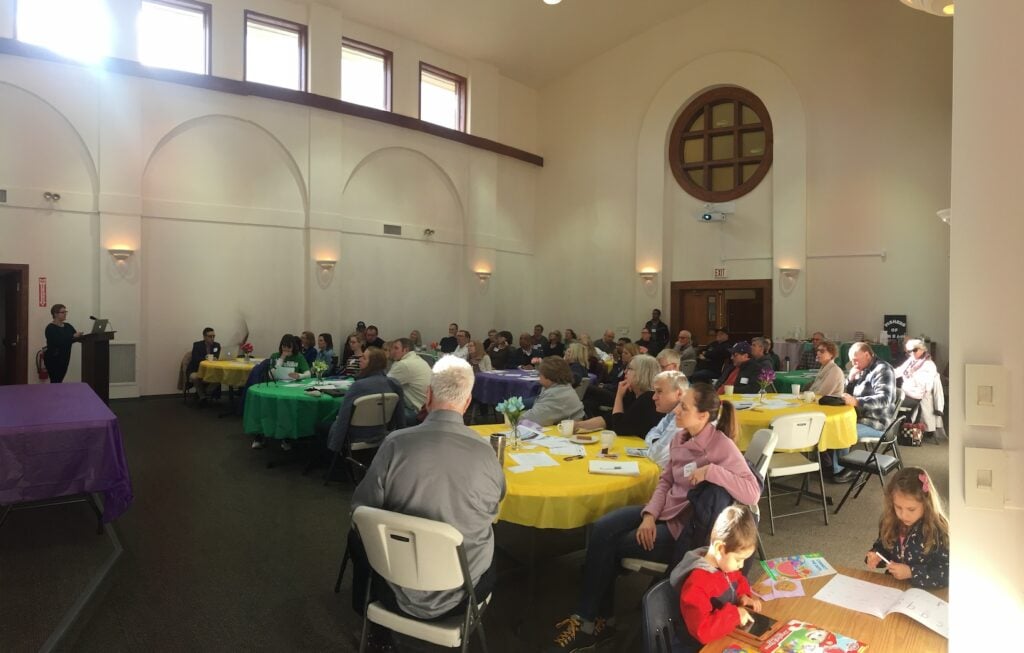
Thaddeus: The institutions in Allegheny County — not unlike probably across the United States — they’re all about making money. So the medical community, we can’t get them to talk to us on anything. How about the universities? They’re silent.
So what’s going on? I think I know. They have donors, graduates, who exert a lot of influence. That’s why they don’t say anything.
And how about our political leaders? Who do they answer to? Even though we’re the voters, they don’t always answer to us. They answer to industry — whoever has the money. That’s problematic. So we have to raise our voices higher and louder and make a fuss!
How Food & Water Watch Partners With and Empowers Communities
Mia: The fight against fracking in Pennsylvania wouldn’t be possible without so many different people and groups working together. What does Food & Water Watch in particular bring to the table?
Thaddeus: The first thing I noticed is, [Food & Water Watch] paid attention to us. Because I was trying to get the attention of the other environmental groups. I was saying, “We’ve got an issue here in Franklin Park,” and I think they were, like anybody else, saying “Oh, there’s probably not much you can do about it.” But Food & Water Watch came on the scene and they were our savior, you might say.
Your guy in Philadelphia at the time [Sam Bernhardt, former Pennsylvania Organizing Director and current Political Director], he even came all the way from the other part of the state to be with us.
He couldn’t testify because he wasn’t a resident, but he was with us. So that means a lot to have people with you. You always need emotional support, and that’s what’s missing a lot [of times].
Robin: I really love how specific this project is, because it gives a lot of answers and guidance to where a lot of the time, people go, “Well, I’m not sure what we can do here.”
We’re very affectionately stubborn and we don’t take no for an answer; we don’t say “Nothing can be done.” We’re constantly looking for a loophole, or another angle, or any way to approach that, with our strategies, with our tactics, and just really constantly keeping ourselves involved.
We’re lucky enough in the Pennsylvania team, we’re all locals of Allegheny County, but even if we weren’t, your fight is our fight. And every tool that we have in our arsenal, we’re willing to give it a go.
And most importantly, we don’t want to come in, swoop in, and act like we’re the saving grace. You give us a lot of credit, Thaddeus, but we want to empower people for their cause and their community, saying “Here are the tools, this is how we can win.
“How do you want your community to look like? What does a win look like for you? And then we will be with you every step of the way to make sure that we win in the way you want to win, because when you do, everybody does.”
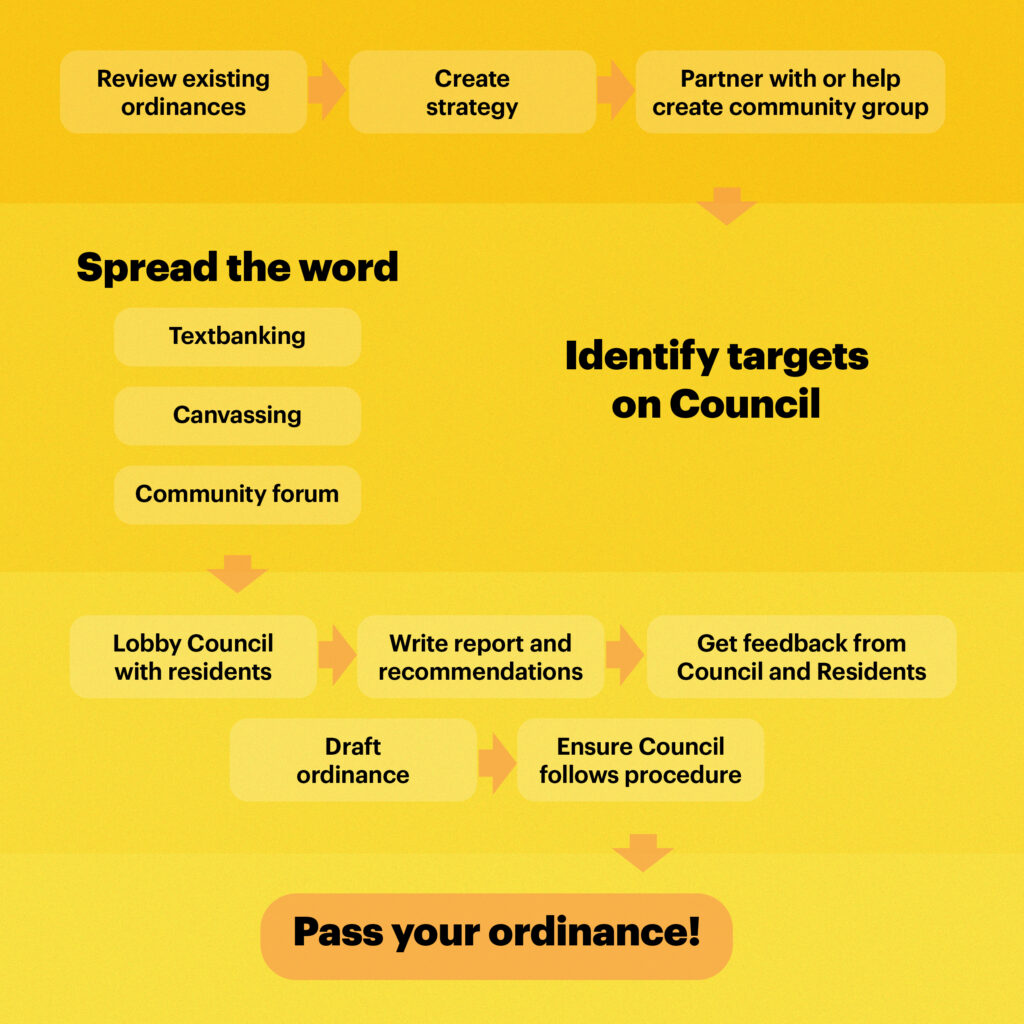
Anyone Can Get Involved and Make a Difference. Your Voice Matters.
Mia: What would you recommend for readers who want to get involved but aren’t familiar with this kind of strategy or this issue?
Thaddeus: I’ll give you an example. I have a good friend who was a Girl Scout leader. The Girl Scouts have a working theme every year, and their theme this year is on climate and plastics. So they asked me for some guidance, and I said, “Well, let’s go to a County Council meeting because they’re putting together an ordinance to ban plastic bags in all of Allegheny County.”
I know Anita Prizio; she chairs the committee for sustainability. So I called her and I said, “This Girl Scout troop wants to get involved — how about if they showed up and testified?”
And she said, “That would be wonderful.”
So I went back to Sarah, who’s the Girl Scout leader, and said, “What do you think? They have three minutes to say something, but they can all be there.”
And she said they got so excited. That’s civics in action! Government in action! I see it as a lot of fun, but at the same time, it’s getting people to understand how things work.
They don’t know how to get involved or when they want to, maybe it’s too scary. I run into a lot of people who say, “But I’ve never talked in public.” That’s okay! You’ll even sound better because you can say right up front, “I’m nervous doing this.” Say that out loud! And you’re more credible than I am, because they see me all the time!
Robin: County and local governments, they work for you, not the other way around, so making your voice heard [is important] — and if you don’t know about something, you can look it up on the Internet, you can look it up on their website, or you can also just contact your council person and say, “I’m concerned about this. What are we doing about it?”
We need you in Pennsylvania! Check out opportunities to join our fight against fracking.
Enjoyed this article?
Sign up for updates.
TO TOP
Endnotes


